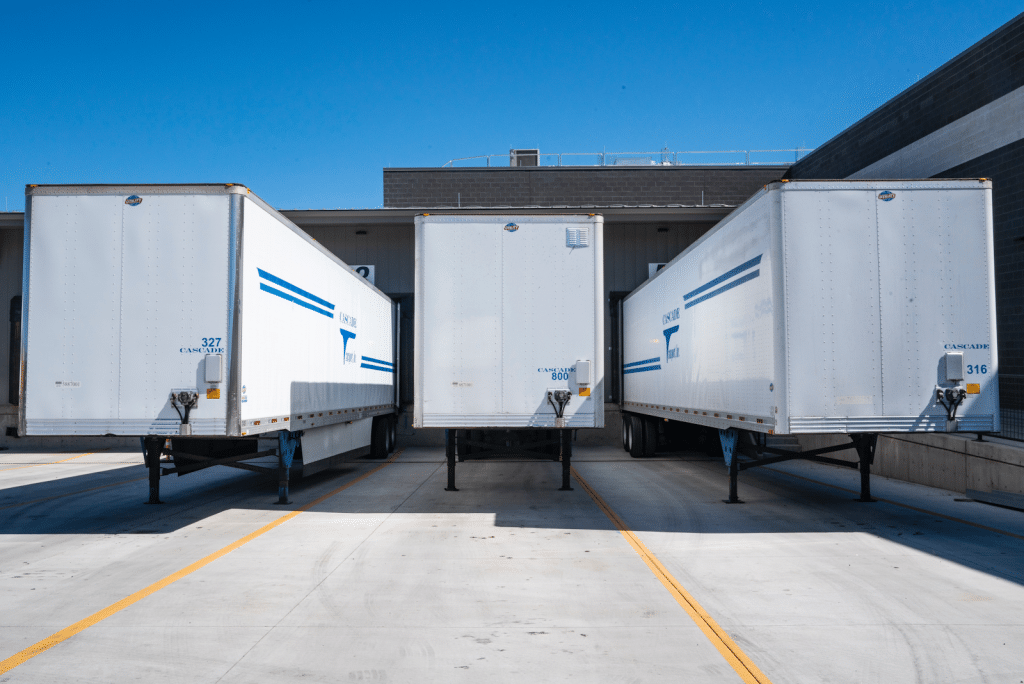As time goes by, businesses grow and get better. They continue to need reliable, fast, and efficient logistics. The third-party logistics (3PL) industry expands by 7.4% annually through 2023. A third-party logistics provider plays an essential role in the delivery of goods and services across various industries. They provide a wide range of third-party logistics services such as freight forwarders, warehousing and distribution, transportation services, value-added services (such as customs clearance), supply chain integration, and more. They play a role in facilitating trade and providing support to businesses.
What Is Third-Party Logistics And Their History?

The terms fulfillment centers and fulfillment warehouses are interchangeable. It depends on whether referring to third-party logistics or 3PL. Logistics service providers offer many services. But other fulfillment businesses also provide these services for their customers. Among these services are:
- Warehousing
- Inventory management
- Shipping and Receiving
- FTL and LTL freight shipping
- Picking and packing
- Kitting and customization
- Reverse logistics (returns)
An eCommerce fulfillment firm is a third-party logistics company. It offers every service you require to contract out your logistical operations.
Different 3PL service providers have areas of fulfillment and warehousing specialization. Some people can handle chilly fulfillment services. Food goods that need to be frozen or refrigerated can be stored and transported in these facilities. Hazardous items can be shipped and stored by other 3PL providers. One of the best third-party logistics companies for large, heavy, and expensive goods is Red Stag Fulfillment.
The Benefits Of Using Third-Party Logistics On Supply Chain Management

There is a broad list of advantages to working with 3PLs in these applications. Below are some illustrations of these benefits.
Reduce the cost of business operations.
Any examination of the advantages and disadvantages of 3PLs will start with the benefits of outsourcing. Any outsourcing can dramatically lower your company’s operating expenses. You don’t have to spend money on long-term or permanent staff. You may avoid paying traditional staff. You can do so by paying for the task after finishing it. You may increase your investment in business operations with product development. And with marketing with the money you have saved.
Your profit-investment ratio is in good shape. The reason is that these providers use lower overhead expenditures. This feature implies that you won’t put more money into your firm. It will significantly enhance your cash flow and boost your profitability.
Comparatively speaking, 3PLs have better clout with freight firms than individual shippers. These companies are better at bargaining prices. They do so when dealing with several carriers and clients. They will always base their discussions on the amount and regularity of your company’s orders. Doing so gives you the assistance you need in your business.
Last but not least, 3PLs provide the explanation of expenditures associated with:
- WMS
- Voice picking
- Automated sortation
- Conveyance systems
You will benefit from this. Both in terms of cost savings and faster order fulfillment. (One advantage of having a lot of orders is that certain carriers give discounts to company owners who utilize their 3PL shipping accounts.)
Proactively save you time and money.
Proactively saving you time and money comes in as the next key pro. It is when weighing the benefits and drawbacks of 3PLs. Again, this is among the most crucial components of outsourcing in general. You may free up time for yourself. And it will lessen the likelihood that your staff will overwork themselves. You can do so by giving the task of managing shipping operations to a 3PL. A third party can execute the activities you require with professional efficiency. It is in place of someone needing to labor beyond their job obligations.
The task handling by a 3PL might include forecasting as one of the services. They may forewarn you of potential errors your management team might make. These errors might have expensive repercussions. Rather than just alerting you to the current events in your supply chain. You’ll be able to optimize your inventory. Doing so lowers the associated holding expenses.
With this support, your company may avoid suffering. And you may acquire the necessary expertise to create effective operational methods.
Scale and optimize operations
Your business processes improve by working with a 3PL. You won’t have to accept warehouse personnel. Even space that is insufficient for your business or inventory demands. Instead, you may grow your activities to include the following components with a 3PL:
- Space
- Labor
- Transportation
- Inventory
These components are additional factors to reduce your investment costs. Doing so enhances the cash flow of your company. This benefit is partly attributable to the fact that 3PLs frequently invest in their warehouse space. This feature is good for you. The reason is that you won’t have to purchase and manage your storage space.
You won’t be making regular payments for the 3PL. As a result, you may adjust your budget to your inventory. Not like when sticking to a set monthly payment amount.
Additionally, they will take care of inventory management for you. Doing so relieves you of the staffing and monitoring duties. For businesses associated abroad, some 3PLs even provide a selection of warehouse sites.
Other components for you won’t worry you about staffing. They are inventory shipping and handling support. During periods, Your firm may encounter sales peaks for this reason. Therefore, you won’t have to worry about your business becoming overrun with orders. For your company, a 3PL will fulfill the following tasks:
- Pull inventory
- Pack products for transportation
- Shipping products
The ability to test new markets abroad
This benefit is due to the fact that certain 3PLs have a global distribution of warehouses. Many of them possess storage facilities in many nations. This not only enables quicker product distribution, for instance, if you were selling to an international client, but it also provides you an advantage in your sector.
You may test the worldwide markets with the help of strategically placed warehouses without taking the chance of having to make a significant investment in personnel or warehouse space, for instance. If you haven’t already, you might wish to move forward with selling your goods abroad if:
- You’ve observed a rise in orders from abroad placed through your business (whether that be in terms of volume or percentage of total orders from your store)
- You’ve noticed that, outside of your country of residence, your consumers are placing orders from a certain area or nation.
These are excellent signs that the attraction of your company to customers throughout the world is expanding. You will have all the knowledge you want to grow your business if you take note of the nations from where these orders are originating. With this knowledge, you may find a warehouse for your company in the nation with the biggest activity. You should also keep track of how many nations you have already sent to. This will enable you to expand your reach internationally and obtain a comprehensive study of product demand.
Note that these signs apply to vendors that can ship globally but have not yet done so extensively owing to a lack of demand. For vendors who have not yet started taking on international orders, check to see whether there has been a spike in inquiries from foreign customers. You may test the waters with a 3PL and determine whether these inquiries will ultimately result in sales.
The Downsides Of Using Third-Party Logistics On Inventory Management

Although hiring a 3Pl may seem like it has only advantages, you should be aware of a few disadvantages before making this choice. Not every firm will gain from working with a 3PL. For instance, a relationship between a 3PL and a larger company may result in costs or repercussions for a small firm that may never be seen.
The main drawbacks of 3PLs are listed below for you to be aware of before beginning this process.
Forfeiting Control Over the Process of Delivery
The main advantage of working with a 3PL might also be its largest disadvantage. Giving up control of the delivery process may be quite challenging for some business owners, despite the potential benefits in terms of time and money savings. This could create unanticipated difficulties for corporate operations and might cause conflict if issues like:
- Delays in shipping
- Complications or confusion in customer orders
Since your clients will turn to you rather than the 3PL for an explanation, these concerns may become well-known problems quite soon. Whether they use your name or not, keep in mind that your 3PL is an extension of your business. This implies that any mistakes made while they were in charge would also reflect poorly on you.
Significant costs upfront possible
A 3PL may cost a big lot up front, although they will unquestionably save you money in the long term. This is particularly concerning for companies that don’t require a lot of storage space or don’t initially have a lot of orders.
An unambiguous understanding of roles, duties, and expectations is essential to keeping upfront expenses under control. A top-tier 3PL will adjust up-front pricing based on the services offered. If your company needs a lot of storage space, you may anticipate paying more upfront than a company that only needs transportation and warehouse operating services and has enough room on site.
Distance from your product
This is where you need to be judicious in your 3PL supplier selection. You may have major inventory management problems if you unintentionally (or inadvertently) select a vendor with warehouses located distant from your location.
The inventory under a 3PL’s control is to be managed by:
- Keeping stock
- Shipping products to both you and your consumers
- Handling inventory
But they must also be in charge of assuring the caliber of your goods (namely, checking that they are in good condition before distribution). A distant warehouse may provide difficulties for routine business operations if you wanted to examine your stock or had problems with quality control.
The Top Third-Party Logistics Available For Logistics Operations
United Parcel Service (UPS)

American parcel delivery provider UPS has been in operation for more than a century. With activities in shipping, air freight, trucking, last-mile delivery, and drone delivery, UPS is a giant in the logistics industry. With $100 in borrowed money, the business was founded in 1907 as a tiny messenger service in Seattle. Today, UPS operates distribution and warehouse facilities totaling more than 35 million square feet at around 1,000 locations across 120 countries, serving more than 220 nations and territories.
Revenue: (12 months ending March 31, 2020), $74.969 billion, and $74.094 billion (2019)
Headquarters: Atlanta, Georgia, USA
Deutsche Post: DHL Group

Despite being American in origin, DHL is currently a German enterprise. Beginning in 1969 as DHL Air Cargo, the business had grown by the late 1970s and was providing services all over the world. Deutsche Post began purchasing DHL stock in 1998 and finished the transaction in 2002, adding the name “DHL” to its logistics services. After the German national mail service was privatized in 1995, Deutsche Post was established. As of 2019, DHL was in charge of about 430 warehouses totaling 121 million square feet.
Revenue: $72.43 billion / €63.3 billion (December 2019)
Headquarters: Bonn, Germany
FedEx Corporation

The American global freight corporation FedEx, formerly known as Federal Express, was established in 1971 as a method for a time-sensitive delivery. Since 2014, FedEx has held the title of largest cargo airline in the world in terms of scheduled freight tonne kilometers (FTK), and it is the fourth largest in terms of fleet size. FedEx set aimed to become a full-service freight operator and a major participant in global logistics. With operations in more than 220 areas worldwide and more than 35 million square feet of warehouse space under its control, FedEx remains a pioneer today.
Revenue: For the year ending on May 31, 2020, $69.217 billion, and $69.693 billion (2019)
Headquarters: Memphis, Tennessee, USA
Kuehne + Nagel Inc.

In Bremen, Germany, Kuehne + Nagel Inc. was founded in 1890 as a forwarding commission company for cotton and other aggregated freight. It evolved into a Swiss holding company with holdings in overland, contract logistics, air freight, and sea freight in the later part of the 20th century, with a concentration on IT-based logistics solutions. The corporation now oversees more than 75 million square feet of warehouse and logistical space across more than 65 nations, including 14 million square feet in the US.
Revenue: $12.230 (12 months ending March 31, 2020), $21.054 billion (2019)
Headquarters: Schindellegi, Switzerland
Nippon Express

The Japanese logistics company Nippon Express, also known as “Nittsu” in Japan, was founded in 1937 as a result of the merging of Kokusai Tsu-un KK, six further rivals, and several other small-scale logistics firms in the country. It received additional support from the Japanese government, turning it into a semi-governmental entity. The business, which has operations in more than 40 nations, is an expert in incorporating various types of transportation into logistical solutions. Nippon Express has a robust network of 744 branches in 48 countries and regions, and it possesses more than 31.7 million square feet of warehouse space in Japan and another 25.8 million square feet abroad.
Revenue: $213,501,000,000/19,9 billion (the fiscal year 2018)
Headquarters: Tokyo, Japan
FAQs
What are Third-Party Logistics Providers?
Outsourcing service known as third-party logistics, or 3PL, controls the operational logistics of shipping operations from warehousing through delivery. This enables business owners to concentrate more on their core operations, assuring the continued success of their job and the improvement of their profit-to-investment ratio.
By outsourcing, businesses may reassign time and resources, thus enhancing their cash flow and operational effectiveness.
What are the pros and cons of using Third-Party Logistics?
Pros
Reduce the cost of business operations
Proactively save you time and money
Scale and optimize operations
The ability to test new markets abroad
Cons
Forfeiting Control Over the Process of Delivery
Significant costs upfront possible
Distance from your product
What are the top Third-Party Logistics available?
United Parcel Service (UPS)
Deutsche Post: DHL Group
FedEx Corporation
Kuehne + Nagel Inc.
Nippon Express
DB Schenker Logistics
GXO Logistics
DSV Panalpina
Nippon Yusen (NYK)
CJ Logistics







